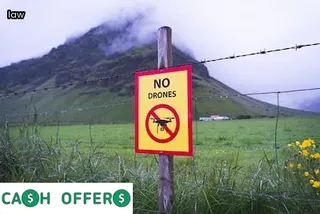Squatting is a type of living situation where someone inhabits an area or property without the consent of the owner or legal occupant. Squatters generally have no rights to the area or property and can be removed from it at any time, but there are certain exceptions in Georgia real estate law that grant squatters some protection.
To understand squatting and squatter's rights better, it is important to distinguish between what it is and what it isn't. Squatting does not include a tenancy agreement between the current occupant and the owner, so it does not apply to people who pay rent for their stay on a property.
It also does not constitute ownership of a property; squatters can only remain on the premises while they have permission from either the owner or legal occupant. Lastly, squatters cannot claim adverse possession of land if they do not meet all of the criteria set out by Georgia state laws.
This comprehensive guide will provide more information regarding these criteria as well as other aspects of squatter's rights in Georgia real estate law.

Squatter's rights, also known as adverse possession, is a legal concept that can be complex and difficult to understand. In Georgia, this legal doctrine gives someone who has been in continuous, uninterrupted possession of real estate for seven years or more the right to claim it as their own.
This means that if a squatter has been living on someone else's property for seven years without interruption and without permission from the owner, they may have ownership rights. In order to qualify for squatter's rights in Georgia, there are certain conditions that must be met.
The squatter must occupy or use the property exclusively; they cannot share it with anyone else. The squatting must be open and notorious, meaning that it is visible to the public and not hidden away.
Additionally, the squatter must pay any taxes or assessments due on the property. Lastly, they must possess the land continuously for at least seven years before applying for ownership rights under adverse possession laws in Georgia.
Understanding how squatter's rights work in Georgia real estate law is essential for both landowners and squatters alike to protect their interests.
Squatter's rights, also known as adverse possession, are the legal concept in which an individual can gain ownership of a piece of real estate by occupying it for a certain amount of time. In Georgia, squatters may acquire legal title to land if they meet all the requirements set forth by the state's law.
These include open and notorious possession of the property for seven consecutive years, payment of taxes on the land, and color of title. Open and notorious possession means that the squatter must openly occupy the land with no attempt to hide their presence.
Payment of taxes is another requirement since this shows that the squatter has made a public declaration of ownership. Lastly, color of title occurs when a squatter has evidence that suggests they own the property even though it is not legally true.
Understanding these components is essential for anyone looking to learn more about squatter's rights in Georgia real estate law.

Squatting is a complex issue in Georgia real estate law, and it's important to understand the intricacies of what makes someone a squatter. A squatter is generally defined as an individual who takes possession of a piece of property without permission or legal right.
This can include occupying abandoned homes, vacant lots, or any other property that is normally not open to public use. To be considered a squatter in Georgia, the individual must also have intent to possess the property for a period of time, although there is no set timeframe for how long may be required for such an intent.
Furthermore, squatters must demonstrate actual physical presence on the land in order to be recognized as such by the state. In addition, squatters must demonstrate some form of ownership or control over the property; this could include planting crops, building structures, or making repairs on existing structures.
These are just some of the complexities surrounding what defines a squatter under Georgia real estate law; understanding these intricacies is essential for anyone looking to exercise their rights as a squatter in Georgia.
When it comes to squatter's rights in Georgia real estate law, understanding the difference between a trespasser and a tenant is essential. In general, trespassers are those who enter or remain on another person's property without permission and without any agreement for payment of rent.
Tenants, on the other hand, are legally recognized occupants of a property who have an agreement with its owner that entails payment of rent in exchange for access to the property. This agreement may be verbal or written and usually lasts for a specific period of time.
Under Georgia law, a trespasser is not entitled to any legal rights, but tenants possess specific rights such as the right to privacy and quiet enjoyment granted by their landlord or owner. It is important to remember that renters do not necessarily gain squatters' rights simply because they have been living on the property for an extended period of time; only tenants can acquire these types of protections in Georgia real estate law.

Tenants at sufferance are an uncommon, but important aspect of Georgia real estate law. While the concept of a tenant at sufferance might sound confusing, it is in fact relatively straightforward.
In real estate law, a tenant at sufferance is defined as someone who remains on another's property without permission or legal right after their lease has expired or been terminated. While this person does not have any legal rights to the property or its use, they do have certain protections under the law.
For example, if the landlord attempts to pursue eviction proceedings against a tenant at sufferance, then the tenant can defend themselves using certain legal rights that protect them from unlawful eviction and other harms. As such, it is important for both landlords and tenants alike to understand what constitutes a tenant at sufferance and the associated legal implications.
Understanding the basics of Adverse Possession Claims in Georgia is crucial for anyone interested in claiming squatter's rights. To make a successful claim, you must have exclusive and continuous possession of the land for at least seven years, with a clear intent to possess it.
The state also requires that the possession be visible, open, notorious, and hostile. Visible means that the use of the land must be apparent enough to be seen by ordinary observation; open and notorious means that it cannot be hidden or secret; and hostile means it must be without permission from the true owner.
Additionally, you must pay all property taxes on the land as well as maintain any improvements made to it. It's important to note that squatting on public lands is not recognized under Georgia law.
Finally, if your claim meets all legal requirements and has been approved by a court of law, you may gain title to the property after seven years.

Squatters in Georgia can present a significant challenge to homeowners, but with the right knowledge, they can be dealt with appropriately. Knowing your rights as a homeowner is key to protecting your property from unwanted squatters.
In Georgia, a squatter is an individual who wrongfully occupies property without permission or legal right to do so. Squatting is illegal in the state and can result in criminal charges in some cases.
To protect yourself, it's important to understand Georgia real estate law regarding squatters' rights and how you can use it to take action against them. You may be able to evict a squatter from your property by filing an unlawful detainer lawsuit or seeking an injunction from the court.
Additionally, there are several steps that you can take before taking legal action such as posting "no trespassing" signs on your property and notifying local police of any suspicious activity. Finally, it's important to remain aware of any changes to Georgia real estate law that could potentially affect your rights as a homeowner when dealing with squatters.
With this comprehensive guide to squatter’s rights in Georgia real estate law you will be well-equipped to protect your home and property from any unwanted squatters.
Evicting a squatter from your property can be a difficult and complex process, particularly in Georgia where real estate law is governed by specific statutory guidelines. Squatters are people who occupy property without permission from the legal owner, and legally must be removed through an eviction process.
It is important to understand the steps involved in evicting a squatter in order to ensure that the process is carried out lawfully. The first step is to serve the squatter with an eviction notice, which outlines their rights and provides them with time to vacate the property or contest the eviction notice.
If they do not comply, then you may need to file a lawsuit for unlawful detainer, which requires a court hearing before any action can be taken. After this hearing, if you win the case then you can receive an Order of Possession from the court that allows you to retake possession of your property.
You must then follow up with a Writ of Possession so that local law enforcement can enforce the order and remove any remaining squatters from your property. It’s important to note that during this entire process it’s best practice for all communication between parties to take place in writing in order to protect all parties involved as much as possible.

In Georgia, a squatter is considered an intruder on your real estate property. This means they are someone who lives on the land without the owner's permission or any legal right to do so.
The law regarding squatters in Georgia is complex and varies depending on the circumstances of the individual case. Generally, if a person has been living on the property for seven years or more they may qualify as a legal squatter and will be entitled to certain rights.
However, if they have not been living on the property for seven years, or have not made any improvements to it, then they are considered an illegal squatter and can be evicted with certain legal measures taken by the owner. It is important for those with real estate in Georgia to understand their rights when it comes to squatters and seek proper guidance from a lawyer if needed.
Navigating Adverse Possession laws in Georgia can be a complicated and difficult process. In order to properly understand your rights as a squatter, you must be familiar with the specific laws that govern these kinds of situations.
Georgia real estate law allows for squatters to acquire legal ownership of a property if they meet certain criteria and follow the necessary steps. For example, squatters must occupy the property openly and notoriously, with the intention of taking over possession from the true owner.
Additionally, they must also use the property continuously for a period of seven years or more. Knowing these rules is essential for successfully asserting your rights as a squatter in Georgia.
Moreover, it's important to remember that squatting does not guarantee legal ownership since various other factors may come into play in such cases. Therefore, it's best to consult an experienced lawyer before pursuing any kind of claim related to adverse possession in Georgia real estate law.

Having a clear understanding of how Georgia real estate law protects against squatters is essential for property owners. If a squatter establishes ‘color of title’, they may have legal rights to the property and can be difficult to remove.
Color of title claims occur when a squatter has obtained some form of legal document that suggests they have a right to the property but does not prove ownership. It is important for landowners in Georgia to understand the various ways color of title claims can become established, as well as what can be done to protect against them.
For example, many squatters will claim color of title through an invalid deed or other document that appears to be legitimate but was never properly recorded with the county or state. The best way to avoid such a situation is by regularly checking all local government records or having an attorney review them on your behalf.
Additionally, if you find yourself with a squatter who has established color of title, you should contact an experienced real estate lawyer who can advise you on what steps should be taken next in order to protect your interests and reclaim your land.
Squatting in Georgia is a legal process by which a person or group of people occupy an abandoned or unoccupied space or building, usually residential, that the squatter does not own, rent or otherwise have lawful permission to use. Squatting is illegal in most states, including Georgia.
While squatting may seem like an easy way to acquire free housing, it carries serious risks and consequences. One such consequence is jail time.
In Georgia, a squatter can be charged with criminal trespassing, which is punishable by up to one year in jail and a fine of up to $1,000. Furthermore, if a squatter damages the property they are occupying they may face additional charges such as burglary or criminal damage to property.
To avoid these risks and consequences it is important for potential squatters familiarize themselves with the laws regarding squatting in Georgia before taking any action. This comprehensive guide outlines what you need to know about Georgia real estate law related to squatters’ rights and how to stay safe while squatting in the state.

Squatters in Georgia have limited rights, but the police cannot legally remove them from a property. In some cases, a landowner may be able to evict a squatter through legal means, but this is not always possible.
According to Georgia real estate law, squatters may stay on a property until they are formally evicted by a court order. In some cases, squatters can acquire legal rights over time if they meet certain criteria such as occupying the property continuously for up to seven years without permission from the owner.
However, it is important to note that police officers in Georgia are unable to forcibly remove squatters from private property without an eviction order or proof that criminal activity is occurring. Therefore, it is important for landowners in Georgia to familiarize themselves with their rights and follow the proper procedures to ensure a successful eviction of any squatter on their property.
In Georgia, squatters rights are a form of property law that can be used to claim ownership of land or buildings without having to purchase them. To claim squatters rights in the state, you must adhere to certain rules and regulations.
First, you must occupy the land for at least seven years uninterruptedly. This means that you cannot leave your property for more than a year at any given time.
You must live on the property as if it were your own home and make repairs and improvements to it over time. Secondly, you must pay taxes on the land or building that you are claiming.
This is necessary to show good faith towards the owner and prove that you intend to keep the property permanently. Additionally, you must have a strong intent to stay on the land; this can be demonstrated by creating records of your occupancy such as utility bills or other documents showing regular use of the property over time.
Finally, if someone else has already claimed squatter’s rights to the land before you, then they will have priority over your claim unless there is evidence of fraud or bad faith from their part. Understanding these steps is key if one wishes to claim squatter’s rights in Georgia real estate law and gain ownership of a piece of land or building without having to purchase it outright.
Squatters rights, or adverse possession, is a legal concept that provides an individual who has occupied a property without permission of the owner for a certain period of time with the right to become the property's new legal owner. In the state of Georgia, squatters have the right to claim ownership after seven years of uninterrupted occupancy.
This period may be shortened to five years if there is proof that taxes were paid on the property during this time. The exact details of Georgia's squatter's rights law can be found in O.
A § 44-5-161 and vary from other states' laws on this matter. Therefore, it is important for potential squatters to understand their rights and responsibilities under Georgia law before occupying any property.